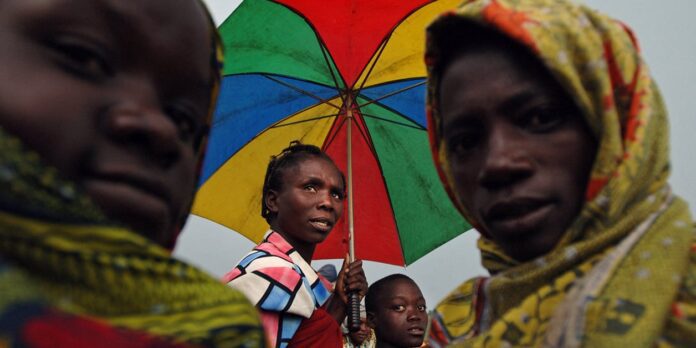Rape is used in conflicts as a deliberate military strategy and is feared by women and girls as soon as the shots ring out.
You are right to be concerned and it is important to highlight the extent to which reporting and other forms of sexual and gender-based violence have become common in humanitarian crisis contexts around the world.
Cases of conflict-related sexual violence continue to rise. In 2022, the United Nations Security Council reported that 49 groups are regularly suspected of or responsible for evidence or other forms of sexual violence in areas of armed conflict.
Maneuver aimed at terrorizing the population
Testimonies similar to this woman from Central Equatoria, South Sudan, are unfortunately very common. Attacked by soldiers in her own home, she says: 'After one man bit me, another pointed his gun directly at my chest and told me that if I didn't accept it, he would kill me.' Their terrified children stood nearby as this human rights violation unfolded.
Social norms report gives armed men the opportunity to attack women
Acts of sexual and gender-based violence increase whenever armed conflicts erupt, because fear, chaos and confusion have found perfect cover for the perpetrators. Conflicts have worsened gender inequalities, which have disproportionately affected women and girls around the world, and worsened the levels of violence they suffer.
The collapse of social norms, legal restrictions and common protections gives armed men the opportunity to attack women, girls and teenagers vulnerable. It is often a premeditated maneuver aimed at terrorizing the population.
Conflicts and natural disasters tear families apart, displace women, girls and teenagers and force them into refugee camps and other unsafe places. We alienate ourselves from their community, social structures and support networks, as well as social and health services.
In these contexts, they are much more exposed to acts of gender-based violence and are extremely vulnerable to physical, sexual and psychological harm. For example, in 2021, violence against women and girls accounted for 97% of reported cases of conflict-related sexual violence.
Lack of insurance migration channels
Women, children and adolescents in migration are also at greater risk of gender-based violence due to the lack of safe and regular migration channels. This situation is worsened by inadequate access to services and information, particularly regarding rights, as well as language barriers and the lack or absence of decent work and education opportunities.
A study of migrants and refugees on the border between Colombia and Venezuela ranked care management and the prevention of sexual and gender-based violence among the top ten unmet needs in sexual and reproductive health.
According to the results of 19 studies carried out in 14 countries, 21% of displaced women have experienced sexual violence. However, the real number is probably much higher, as recording of incidents is incomplete and women are often afraid to speak out, fearing social stigma.
When faced with desperate situations, women, girls and teenagers may be forced to trade sex for food, money and other resources needed to survive. Up to a third of girls living in humanitarian settings said their first sexual encounter was provoked.
Diverted resources
But conflict is not the only driver of sexual and gender-based violence. Health emergencies, including Covid-19 and natural disasters due to climate change, are also important factors. A summary study initiated by UN Women revealed that more than half of women interviewed reported that they or people around them had experienced physical and verbal violence since the start of Covid-19.
The UN has confirmed more than 24,000 serious injuries against children and adolescents in 20 countries
Covid-19 has disrupted basic health services and diverted resources to respond to the pandemic. Long-standing barriers to accessing services, such as stigma, fear of reprisal, and weak rule of law institutions, have been exacerbated by the pandemic. Additionally, movement restrictions due to Covid-19 help prevent survivors of sexual violence from accessing essential services.

refugees © Luis Tato/AFP
Climate change and natural disasters are the cause of poverty, displacement, conflict and school dropout. They indirectly lead to an increase in cases of child marriage, which is recognized in international law as a form of gender-based violence.
Unfortunately, child marriage is just one outrage among many. During 2018, the UN confirmed more than 24,000 serious injuries against children and adolescents in 20 countries, including the recruitment of child soldiers, murder or mutilation, as well as sexual assault or abduction.
Prevention and parts
These atrocious acts will not disappear on their own. We urgently need to take specific actions and instructions to prevent and manage acts of sexual and gender-based violence, especially in humanitarian and fragile contexts, in strict accordance with international human rights law and international humanitarian law.
Most of these crimes go unpunished
Survivors of specific sexual and reproductive health services, as well as social assistance. However, the facts show that this care is often not available. They also demand justice and accountability against the perpetrators of these crimes. However, most crimes go unpunished, those responsible go unpunished, and survivors are left without parts or recourse.
At the global level, there is a need for concerted multilateral efforts to accelerate the fight against sexual and gender-based violence and strengthen international collaboration for comprehensive sexual and reproductive health and rights for all people, including the prevention of sexual and gender-based violence. gender. violence. We must also ensure gender- and age-appropriate reparations for all survivors, in line with international human rights law and international humanitarian law.
At the national level, countries should establish support and protection frameworks and focus resources to protect the physical and mental health of refugees and others at risk of personal violence and conflict-related displacement. Measures must be part of a comprehensive agenda for sexual and reproductive health and rights, which protects access to sexual and reproductive health services in all contexts, including humanitarian response.
Measures are also possible to promote accountability, guarantee access to justice and remedies for survivors, and combat impunity for perpetrators.
Invest to end this scourge
Countries must invest in long-term social protection investments and programs to integrate this agenda into emergency humanitarian actions and programming across sectors. This includes investments in capacity building, monitoring and data analysis, essential training of health professionals and adequate safe and supportive work environment.
Our actions must be guided by the fundamental principles of human rights
We face a global scourge of sexual and gender-based violence. It feeds on the lawless chaos of conflict, the unprecedented disruption of Covid-19 and the growing destruction caused by climate change.
The United Nations Committee on the Elimination of All Forms of Discrimination against Women has developed guidance on the gender dimensions of disaster risk reduction for women in the contexts of climate change and conflict prevention, during and after conflicts.
Our actions must be guided by fundamental principles of human rights – equality and non-discrimination, participation and empowerment, accountability and access to justice. We have the tools to put an end to this scourge, but this required an integrated partnership approach at all levels. No link works alone. Furthermore, each sector must contribute to the eradication of sexual and gender-based violence in conflicts and situations humanitarians.

